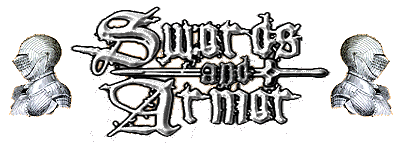
Roman Swords and Armor

Lorica Segmentata ArmorRoman Helmet
|
Gladius Battle
Sword SD910894 |
The Roman Kingdom
Ah, Roma! Now a destination for lovers of history and romance, Rome continues to
inspire us with its former cultural contributions to modern society. One of the
greatest empires to ever spread throughout Europe, Asia and Africa, its impact on
mankind is even now felt, particularly in their ideas of warfare, armor, weapons,
swords and politics.
The Roman Kingdom was established around 753 BC in the Palatine Hill area of the
Tiber River although evidence supports that people began living there around 1000 BC.
Here, according to legend, Romulus and Remus, future leaders of this kingdom, were
orphaned, found by a she wolf named Lupa and nurtured by her in a cave. Found by a
shepherd and then raised by him and his wife, they overthrew their great-uncle, who
had killed their grandfather for the throne. Why these two orphans were placed in a
cave was never explained but perhaps the evil great-uncle saw an early opportunity to
stamp out possible threats to his claim. The two young men decided to build a city on
the banks of the Tiber, but tragedy struck as they were arguing over the details.
They donned their armor, fought and Remus was killed by his brother, Romulus, who is
the origin of the name Rome. Remus became the first well known victim of the Roman
need to control and conquer its surroundings by the sword.
Little has survived in the way of written records although myths and legends still
speak to us from that time period in Rome’s history. Enough survived the
centuries to establish that Rome elected its kings and the city flourished as it was
in an easily defended area of the Tiber River and the Palatine Hill being surrounded
with six other hills, forming the famous Seven Hills of Rome creating a natural armor
fortress for the city. Rome from ancient times was skilled in defense and was
successful in its warfare which Romulus immediately began to employ to conquer his
neighbors.
Romulus was an innovative and remarkable founder of this nation. He first invited all
men, freed or no, to come and be citizens in his city. He then thoughtfully provided
wives for them by inviting neighboring tribes to a huge festival, where he kidnapped
by force all comely and available young women. This became known as “The Rape
of the Sabine Women”. After the war settled down with the Sabines over this, he
again showed uncommon thinking by sharing ruler ship with the Sabine king, Tatius, at
the behest of 30 of the Sabine women who wished to see an end to the conflict.
He also gave voice to his citizens by forming a delegation of 100 men to act as the
King’s council, which he called a Senate and the participants, Patricians. He
then established circles of social ranking and the ability to voice opinion. The next
level that was considered aristocratic, was called ‘Equites’ which
referred to these men’s abilities as horsemen as these were what we would now
call ‘Knights’. Two more circles followed, Tities (after the Sabine King)
and Luceres (which was from the Estrucans, another ancient civilization). Then a most
interesting concept was the last, which gave every citizen a voice. The bottom rung
were divided into thirty Curiae, who acted like a magistrate court and the actual
care of the city. Here, anyone could have a voice, albeit a smaller one than the
previous circles mentioned. Romulus planted the early seeds that the Republic of Rome
would be born from around 503 AD. This method of leadership continued for centuries
and can still be seen in our modern cultures, which has been greatly influenced by
ancient Romulus.
Roman Armor and Swords Armor and Weapons Index Shields
Swords and Armor Home Lorica Segmentata History
Swords and Armor Bargain Dungeon
!
New Introductions -
Closeouts - All Great Bargains
Shipping Policies and Rates - Returns
copyright 2001-2014
swordsandarmor.com , All Rights Reserved
privacy